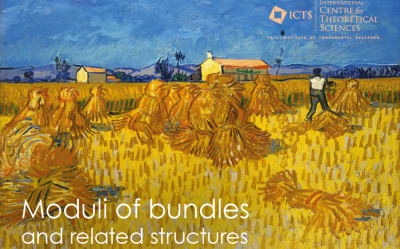Background:
At its core, much of mathematics is concerned with the problem of classifying mathematical structures. Often, one cannot solve the classification problem by simply listing mathematical structures of a given type, as there are continuously varying parameters that enter into the description of the mathematical structures involved. In such cases, the space over which the parameters vary can often be constituted into a ‘geometrical structure’ called a moduli space for the classification problem at hand. On the one hand, understanding the ‘shape’ of this moduli space is tantamount to ‘solving’ the original classification problem, while on the other hand, moduli spaces provide a rich source of examples of interesting geometrical structures whose study is of intrinsic interest.
In geometry and topology, vector bundles – families of vector spaces that are parametrized by a space – play a central role. The study of moduli spaces of vector bundles, and closely related structures such as Higgs bundles, local systems and vortices, has led to deep theorems relating algebraic geometry, differential geometry and topology; these include the Donaldson-Uhlenbeck-Yau theorem, its precursor, the Narasimhan-Seshadri theorem, and the non-Abelian Hodge correspondence. However, many fundamental questions about these moduli spaces remain unanswered.
In recent years, there have been several new insights into the geometry and topology of moduli spaces of bundles and related structures, some of which have originated in physics. This discussion meeting will explore the ramifications of some of these recent developments. They include, among others, (i) a better understanding of stratifications of moduli spaces and their unstable loci, going beyond geometric invariant theory, (ii) new insights into compactifications of moduli spaces and the “behavior at infinity” of the non-Abelian Hodge correspondence, (iii) the “P=W” conjecture, a far reaching statement about the topology of the moduli space of Higgs bundles, (iv) applications of Higgs bundles to higher Teichmüller theory, (v) the theory of spectral networks and their applications to the study of the Hitchin moduli space, (vi) the construction of geometric structures, such as Poisson and cluster structures, on moduli spaces, and (vii) the quantization of moduli spaces, such as moduli spaces of local systems.
Purpose of the meeting:
The purpose of this meeting is twofold:
- A principal aim of the meeting will be to bring together pioneers of some of the recent developments in the field with leading experts in closely related areas, to exchange ideas and explore new directions.
- A second, equally important goal of this meeting will be to expose young mathematicians, especially graduate students and postdocs, to current research in the field.
Structure of the meeting:
Here is a brief summary of the main activities:
Ramanujan lectures: Carlos Simpson (Université Nice) will deliver a series of five ICTS-Infosys Ramanujan lectures during the discussion meeting.
Minicourses: In addition to the ICTS-Infosys Ramanujan Lectures, there will be four mini-courses consisting of two 90 minute lectures each. Like the Ramanujan lectures, the mini-courses will begin at a level that is accessible to a relatively broad audience (graduate students trained in algebraic geometry), and work their way up to contemporary research.
Discussion sessions: A significant portion of the daily schedule will be devoted to discussion sessions for the exchange of ideas, and informal TA sessions where young researchers will lead tutorials or problem solving sessions related to the content of the lectures.
 icts
icts res
res in
in

